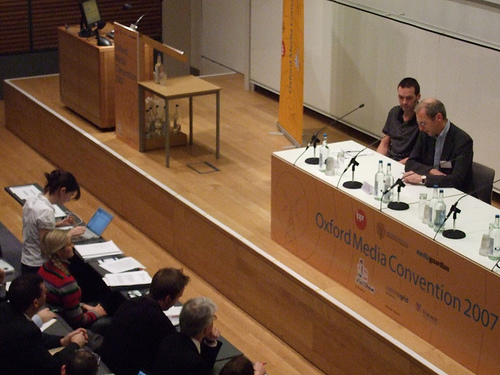Time to get real

Channel 4’s Andy Duncan (to the right); Jemima Kiss (to the left). Photo: Bill Thompson.
I spoke at the Oxford Media Convention on Thursday. I was appearing for the recently-departed Fru Hazlitt, ex CEO of the company I work for.
The event was fascinating, and brilliantly organised. My panel, one of a break-out of three, was held in a small-but-full-to-capacity room. Speaking just before me was Tess Alps from Thinkbox, the television marketing body for the main UK commercial broadcasters. Her message was that we should ‘get real’ - stop believing the hype about YouTube. Commercial television is in fine form and won’t die just yet. She had a lot of information to back that up, and apart from a little bit of knocking copy against commercial radio, spoke sense - particularly her argument that television should stop talking itself down.
Unlike Tess, I’d been told not to bring Powerpoint - by far my preference in a panel anyway. So, I was free to riff on her points, as well as make some of my own.
My points? That radio is already multi-platform. I gave some research from my employer in terms of how regularly people use particular platforms for radio consumption (some of which are uncomfortable); and also argued that younger people are different, but not that different. Older people still consume radio in new and exciting ways: multi-platform is not just a young preserve. It’s a fact that out of everyone in the UK using the internet right now, 20% of them are listening to the radio. Nearly 60% of people check things out on the internet right after they hear them on the radio. Radio tells people what to type into the Google search box.
So, given that we’re already in a convergent media world, we - hang on. Again, it’s time to ‘get real’. The media industry has a long way to go.
The advertising industry is not converged at all. It’s stuck in media-specific silos. An ad on the radio goes to the radio department. They hate the more-fashionable online department. Online hates the television department, because they get to go to Barbados to film ads. So who pays for a video preroll on a radio website? TV? Online? Radio?
The content industry is not converged at all. To launch a satellite-only radio station, I have to pay three times as much to play records than if I am on FM: yet it’s consumed in exactly the same way. To launch an internet radio station can cost hundreds of times more.
And the regulators are not converged. The rules for product placement, for example, are vastly different between radio and television - yet on my Freeview box, TV sits next to radio, and it’s consumed in the same way: but regulated very differently. (And no, I’m not arguing for radio’s regulation to be tighter).
There’s plenty more to say; and the hour of discussion that followed was refreshing and interesting for, I hope, all concerned: though incredibly mentally draining. But Tess is right. We need to get real about the issues our industry is facing.
Excitingly, our panel was selected for a live blog, by Jemima Kiss from Media Guardian. I get a nice (albeit ever-so-slightly-incorrect, my fault) write-up, which I’m delighted with. It focuses the mind when you know that anything you say will be written down and possibly used against you.
Incidentally - I (or Fru, originally) was the only person from the radio industry invited to speak. Were it not for an appearance by The Guardian’s Emily Bell, the event would probably have had to be be renamed the ‘television convention’. Disappointing: I would guess that the UK spends a similar time with radio and TV during any given week, so it would be good to see it given its correct emphasis. I’ll not hold my breath, though.